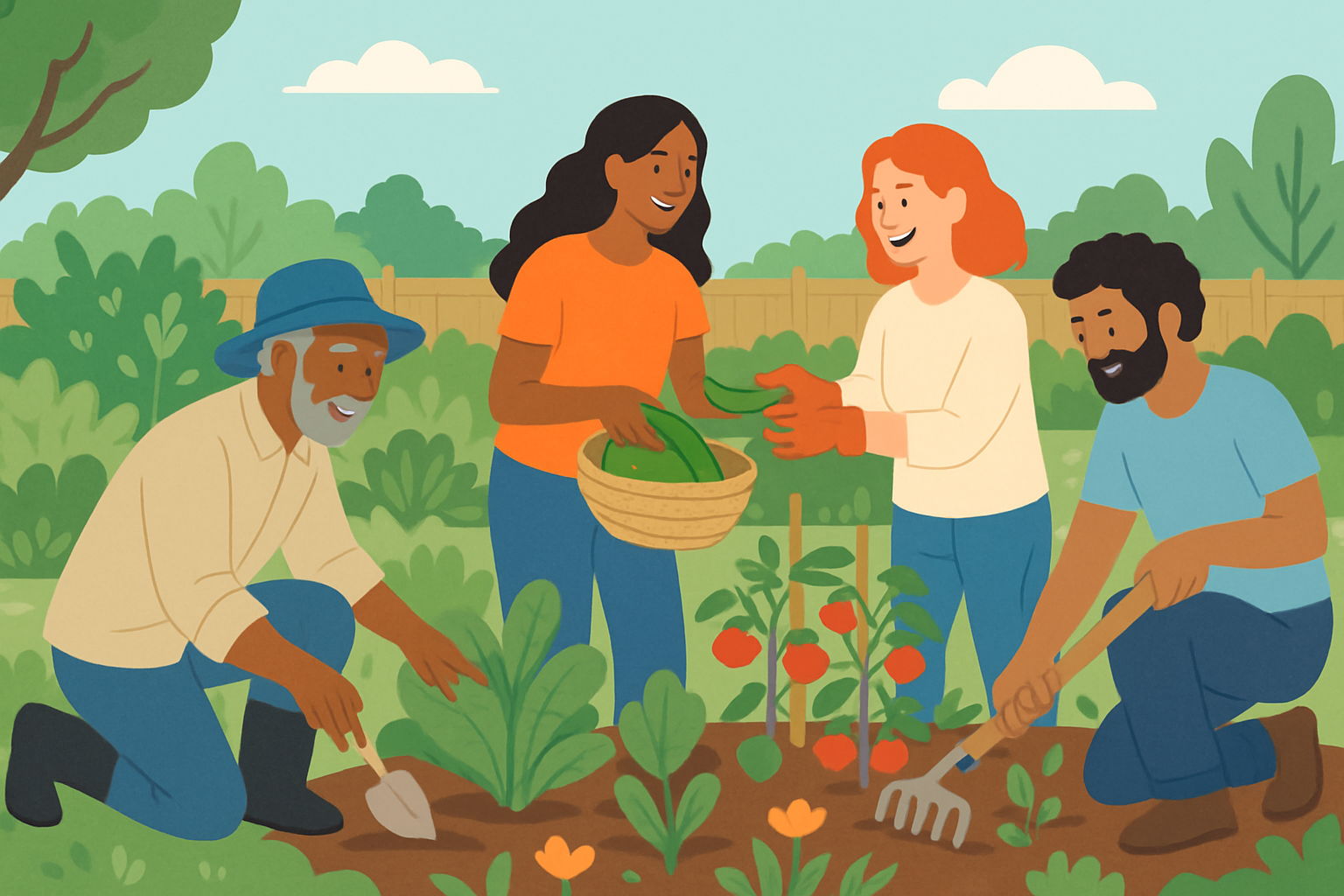The Secret to Living Is Giving Without Expecting Returns

This article explores how giving freely without keeping score can truly transform your life and bring about lasting happiness.
- Dive into the rich philosophy behind selfless giving and uncover its special role in spiritual traditions worldwide
- Find out how small acts of kindness can lift your spirits with a little thing called the 'helper’s high' and calm your stress
- Tackle common roadblocks to giving like the worry of being used or the habit of thinking in terms of quid pro quo
- Pick up straightforward down-to-earth ideas to weave generous deeds naturally into your daily life
- See how consistent giving can leave a lasting mark and deepen your sense of meaning in ways you might not expect
True fulfillment in life rarely comes from stacking up wealth or trophies on a shelf. It blossoms when we give selflessly without expecting anything in return. 'The secret to living is giving' invites us to see life through a lens of generosity and kindness. Embracing this mindset does more than change how we see the world. It transforms our entire experience by unlocking deeper happiness and richer meaning along with genuine connection.
Exploring the Philosophy Behind ‘The Secret to Living is Giving’ a timeless idea that really makes you pause and think about what truly matters in life
The idea of giving without expecting anything in return truly springs from genuine altruism. Across different cultures and eras, selfless giving has been celebrated as a road to deep personal fulfillment and social harmony.
- Altruism is all about lending a hand purely out of kindness and empathy, no strings attached. It’s that genuine urge to help others just because it feels right.
- You give without a second thought about getting anything back. It’s a refreshing way to ditch the usual ‘what’s in it for me’ mindset.
- Karma and selfless acts with good things coming your way down the line, nudging people toward a heartfelt sense of moral duty.
- Reciprocal kindness has this wonderful ripple effect, sparking a cycle of goodwill that uplifts both the giver and the receiver in ways that really matter.
- Giving as more than just charity — it’s a meaningful path to enlightenment and that elusive feeling of inner peace.
The Psychological and Scientific Perks of Giving Without Expecting Anything in Return
Many psychological studies have shown that selfless giving often works wonders for mental health, giving a real boost to emotional well-being and lifting overall life satisfaction. Giving lights up the brain's reward centers, sparking feelings of happiness and quietly nudging stress levels down.
| Study Name | Findings on Giving and Mental Health | Impact on Happiness | Physiological Benefits |
|---|---|---|---|
| Harvard Study of Adult Development (2017) | Those who generously gave their time and support often reported a noticeable boost in life satisfaction — it’s like their happiness banks were getting a steady deposit | Happiness levels consistently stayed on the higher side | Noticeable increases in dopamine and oxytocin, the feel-good chemicals that make us want to pay it forward |
| University of Zurich (2016) | Giving without keeping score was linked to fewer feelings of depression, showing the heart and mind truly benefit from selflessness | Mood improvements and a dip in anxiety symptoms | Cortisol levels took a nosedive, hinting that stress might just take a backseat |
| University of California (2009) | Volunteering wasn’t just a good deed; it seemed to give self-esteem a nice little lift | People reported feeling better overall | Brain reward centers, especially the ventral striatum, lit up as if cheering the volunteers on |
| National Institutes of Health (2015) | People who donated money often felt their lives had more meaning, almost as if their wallets were helping fund their inner joy | A nice bump in long-term happiness was observed | The body responded by releasing a cocktail of positive hormones like endorphins |
| Journal of Social Psychology (2011) | Random acts of kindness didn’t just brighten someone else’s day; they also gave emotional states a gentle upgrade — for both giver and receiver | This led to stronger social bonds and a real sense of connection | Blood pressure went down and heart rate variability improved, suggesting hearts were genuinely in it for the long haul |
Concepts like the helper’s high reveal how doing good for others can spark a natural buzz of euphoria, thanks to a cocktail of endorphins and dopamine that keeps us coming back for more.
Common Challenges in Giving Without Expectation and How to Gracefully Move Beyond Them
Fear of being taken advantage of and second-guessing others' motives often throw a wrench in the works when it comes to truly selfless giving. Overcoming these mental roadblocks usually demands intentional effort—building trust, nurturing empathy and finding a solid sense of inner security.
Notice and gently question any beliefs that treating giving as a sign of weakness or loss is somehow true because sometimes our minds play tricks on us.
Make it a daily habit to practice gratitude. It’s amazing how focusing on what you have rather than what’s missing can shift your whole perspective.
Build your empathy muscle by listening closely and making a sincere effort to see where others are coming from as it’s like opening a new window in your heart.
Start giving in small, manageable steps. Think of it as dipping your toes in the water rather than diving in headfirst to build your confidence and ease into the process.
Cultivate patience and work on nurturing trust in your relationships because this helps quiet those nagging worries about being taken advantage of, which we all face at one point or another.
Giving without expecting a darn thing in return often sparks a deep, genuine joy and a connection that can genuinely enrich your life in the most meaningful ways. It’s one of those rare little gifts that keeps on giving, if you catch my drift.
Simple Ways to Make Giving a Natural Part of Your Day-to-Day Life
Incorporating giving into daily routines often feels surprisingly simple and rewarding. Whether it is offering a bit of your time, sharing resources or lending emotional support, those small acts tend to snowball into a lasting habit of generosity.
- Spend a little time volunteering at local shelters, schools or community centers. It’s amazing how those moments can brighten your day as much as anyone else's.
- Don’t hesitate to offer sincere compliments and encouragement to your friends, family or coworkers because a kind word can sometimes stick longer than you’d expect.
- Support causes that truly tug at your heartstrings by donating money or goods. Every little bit counts even if it feels like a drop in the ocean.
- Share your skills and experience by mentoring or teaching others. You never know whose life you might quietly change along the way.
- Carry out small unexpected acts of kindness like lending a hand to a neighbor or paying something forward because it’s those little ripples that often make the biggest waves.
Keeping a giving mindset really hinges on looking after yourself first and setting clear boundaries to dodge burnout. It’s key to know your own limits and make sure your generosity doesn’t burn out too quickly—after all, giving should be sustainable.

Volunteers sharing warmth and support in a community garden symbolizing selfless giving.
Stories and Real-Life Examples of Giving Without Expecting a Thing in Return
Countless people and communities appear to have cracked the code to a truly fulfilling life by embracing generous giving.
- Charitable leaders who spend decades quietly improving education and health, often without batting an eye for any kind of recognition. - Anonymous donors whose generous contributions work behind the scenes, changing lives without ever stepping into the spotlight. - Community volunteers who consistently show up to support neighbors in tough times, expecting zilch in return but giving their all anyway. - Everyday heroes who sprinkle kindness in small but meaningful ways that genuinely brighten the world around them. - Cultural traditions from every corner of the globe that hold generosity close, treating it like a treasured duty that adds incredible richness to society.
Long-Term Impact of Giving Quietly on a Meaningful Life and Lasting Legacy
Giving regularly without expecting anything in return often lays the groundwork for a lasting legacy that not only shapes future generations but also deepens relationships in ways words can hardly capture.
| Impact Area | Description | Real-World Example |
|---|---|---|
| Personal Growth | Giving selflessly often nurtures empathy, patience, and resilience, planting seeds for personal transformation | Mother Teresa’s lifelong dedication to the poor |
| Community Influence | Helps build tighter-knit social networks and sparks cooperation, kind of like the glue in any good neighborhood | Community gardens bringing new life to urban neighborhoods |
| Emotional Fulfillment | Brings genuine joy and lifts stress through meaningful, heartwarming connections | Volunteers in eldercare noting higher life satisfaction |
| Relationship Deepening | Builds trust and mutual respect over time, like adding layers to a strong foundation | Long-term mentorship relationships |
| Societal Benefits | Inspires a culture of kindness that chips away at inequalities, making the world a bit fairer one step at a time | Charitable foundations working to address systemic poverty |
Keeping Tabs on Your Progress in the Journey of Giving
Taking a moment to really mull over your motives and emotional reactions and how your actions ripple through your relationships can give you a clearer picture of just how genuinely you’re giving without expecting a thing back
Keeping a journal of your daily giving experiences and asking peers for sincere feedback can really help you stay mindful and support steady growth in your generosity journey. It’s amazing how putting pen to paper or typing a quick note nudges you to notice little things that might otherwise slip by. Plus, getting honest thoughts from friends can shine a light on blind spots you didn’t know you had.
Developing a Life Philosophy Centered on Giving Everyday Habits and Attitudes That Truly Stick
Ultimately, making giving a part of your core values comes down to understanding that the secret to living is giving. It takes a bit of conscious effort and a fair amount of awareness.
Start each day by tuning in to what you’re grateful for. It’s amazing how this helps you notice the abundance hiding in plain sight.
Listen closely and pay attention so you can understand what others truly need beyond the words.
Give with intention because thoughtful generosity is better than spur-of-the-moment giving every time.
Before going to bed take a moment to reflect on the good you brought into the world that day. It’s a nice way to end on a positive note.
Try to make giving a regular habit whether that means volunteering, donating or performing small acts of kindness that brighten someone’s day.
"A life spent giving, honestly, feels like one well-lived—where personal growth and social change dance hand in hand with every little act of kindness."
Frequently Asked Questions
How can I start giving if I do not have a lot of money or time?
Giving with an open heart isn’t just about money. You can start with simple genuine acts like tossing out compliments, holding a door open or really tuning in when someone’s talking. These little gestures take barely any time or cash but often spark meaningful connections and boost your confidence when it comes to generosity.
Is not giving without expectation just setting myself up to be taken advantage of?
This concern pops up quite often. Giving without expecting something in return doesn’t mean you throw your limits out the window. It’s about shifting your mindset from ‘what will I get?’ to ‘how can I help?’ You can absolutely be generous while protecting yourself. Saying no when something feels off or clashes with your values is not only okay it’s necessary.
What is the difference between selfless giving and simply being a people-pleaser?
The heart of the matter is why and how you give. People-pleasing tends to be about chasing approval and usually leaves you feeling drained or even resentful. Selfless giving comes from a genuine place—wanting to contribute without needing anyone to pat you on the back. It’s more like a breath of fresh air than a draining chore.
How long does it take to experience the 'helper's high' or other benefits?
That rush from helping, often called the helper’s high, can hit you almost instantly thanks to those feel-good endorphins. The bigger perks like feeling more fulfilled and finding your sense of purpose tend to build up slowly over time when you give regularly. The secret I’ve found is to focus on the act of giving itself instead of waiting for a particular feeling to swoop in.
Can I still give selflessly if I often feel drained or burned out?
Absolutely but it all starts with cutting yourself some slack. You can’t pour from an empty cup. Start by paying attention to your own needs through rest and solid self-care. Then try sprinkling in small acts of kindness that don’t wear you out. That way, your giving stays genuine and sustainable and helps you steer clear of burnout.





